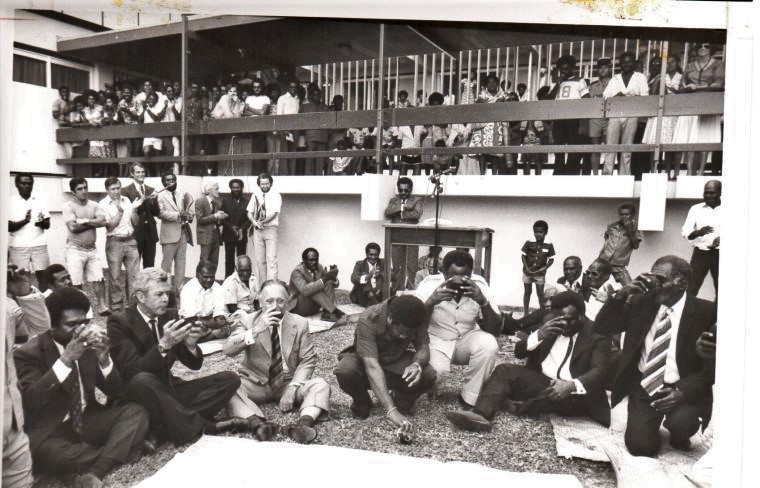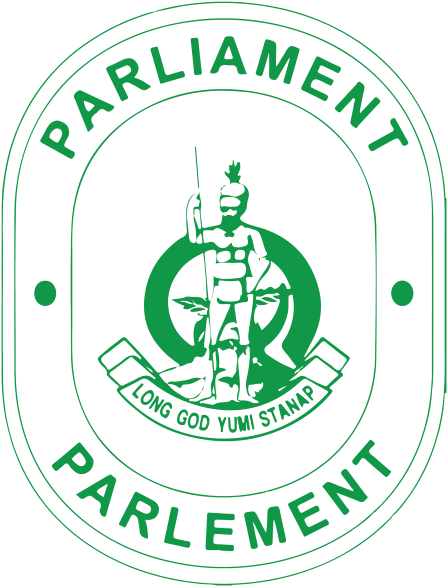Legislation
Legislative Power is exercised by a single-chamber legislature known as Parliament.
Legislative power is the power to give, adopt or amend laws. (The Shorter Oxford Dictionary defines a law as one of a body of rules which a state or community recognizes as binding on its members or subjects).
One of Parliament's most important functions is to approves the nation's budget, which is submitted annually by government as its estimate of the funds required for efficient administration of the country. In addition, all taxation and public expenditure require the authority of a law passed by Parliament. However, only the Government is allowed to introduce legislation levying taxation, or incurring or changing public expenditure.
Constitution of Vanuatu
The Parliament of the Republic of Vanuatu came into existence by the virtue of the Constitution, which is the nation's supreme law: Articles 1 & 2 provide the framework for governing the Republic of Vanuatu and make it clear that the Constitution is the supreme law of the Republic of Vanuatu. This means that all other laws must be consistent with the Constitution.
Download Constitution (English)
Download Constitution (French)
Download Constitution (Bislama)
The Constitution provides for the three Arms of Government
1. THE EXECUTIVE (the Prime Minister and the Council of Ministers)
2. THE LEGISLATIVE (the Members of Parliament)
3. THE JUDICIARY (the Judges of the Courts)
It also provides for the office of the President (mainly a ceremonial position but with the powers kept for times of political trouble, called (reserve powers") and for the Council of Chiefs (which has the important job of advising the Government about preserving Vanuatu customs and traditions).
Brief history of the Constitution Day
Credit: TIV and First Vanuatu President, Ati George Sokomanu

1978 – 1979. Two Very Important Years: Mr. Sokomanu by tivnews
Before 1980, people in the New Hebrides (Vanuatu) were ruled by two colonial powers of Britain and France. People from Britain and France migrated to the New Hebrides, as a result the archipelago was administrated by both Britain and France.
Over time, several aspiring indigenous leaders of New Hebrides decided to work together to gain their independence from the two colonial powers.
Father Walter Lini led the group of indigenous leaders, they worked hard with pride to prove to the colonial masters that they deserve their Independence and are capable or administrating their own country.
Mr. Ati George Sokomanu was a member of that aspiring group, when TIV talked with him he said that “between 1979 and 1980 the group formed the constitution and legislations to prove to the colonial powers that Vanuatu is capable of looking after itself. 1979 and 1980 were two very important and formal years as we tried to form legislatures on how to move forward independently,” Mr. Sokomanu said.
In 1980, New Hebrides was granted its independence after more than 70 years of being colonized. After gaining its Independence it was no longer called New Hebrides but was called Vanuatu – meaning ‘our land forever’.
The leaders struggled for our freedom, they were proud of their achievement and because of that the Mama Law or the Constitution was formed to safeguard those achievements, and to cherish our ethnic, linguistic and cultural diversity.
Ati George Sokomanu, who was elected as the first President of Vanuatu, said, “When a country achieves self-reliance, it needs to have a statue, something to bind everyone and start us off as we go through our journey”.
So in 1979, the leaders sat together and started writing the Mama Law. Mama is the Bislama word for Mother.
“When God sends Moses to the Mount Sinai he gave them two stones with the ten commandments written on it. The Constitution is like the Vanuatu’s ten commandments to guide us as we achieve our independence and work through it,” Mr. Sokomanu related. Firstly, Vanuatu is a democratic country where the people hold the power to elect its members of parliament who make up the government. The government then administrates the affairs of the country.
This Mama Law is the highest law for the nation and every other law comes under it. The independence leaders of the Independence also set out on the mama laws the National and official language for the nation. The national language is Bislama, the official languages are Bislama, English and French and the principal languages of education are English and French. Also the Republic of Vanuatu must protect its native languages as part of Vanuatu’s heritage and can declare any one of them as the national language. The citizens of Vanuatu have the rights to elect the members of parliament to form the government to rule the country. If the parliament establishes other laws, every citizen over the age of 18 years is entitled to cast a secret vote. Political parties may be formed freely and may contest elections but shall respect the Constitution and the principles of democracy.
This was the first chapter of the Mama Law agreed on by the people who led the country to Independence in 1980.
